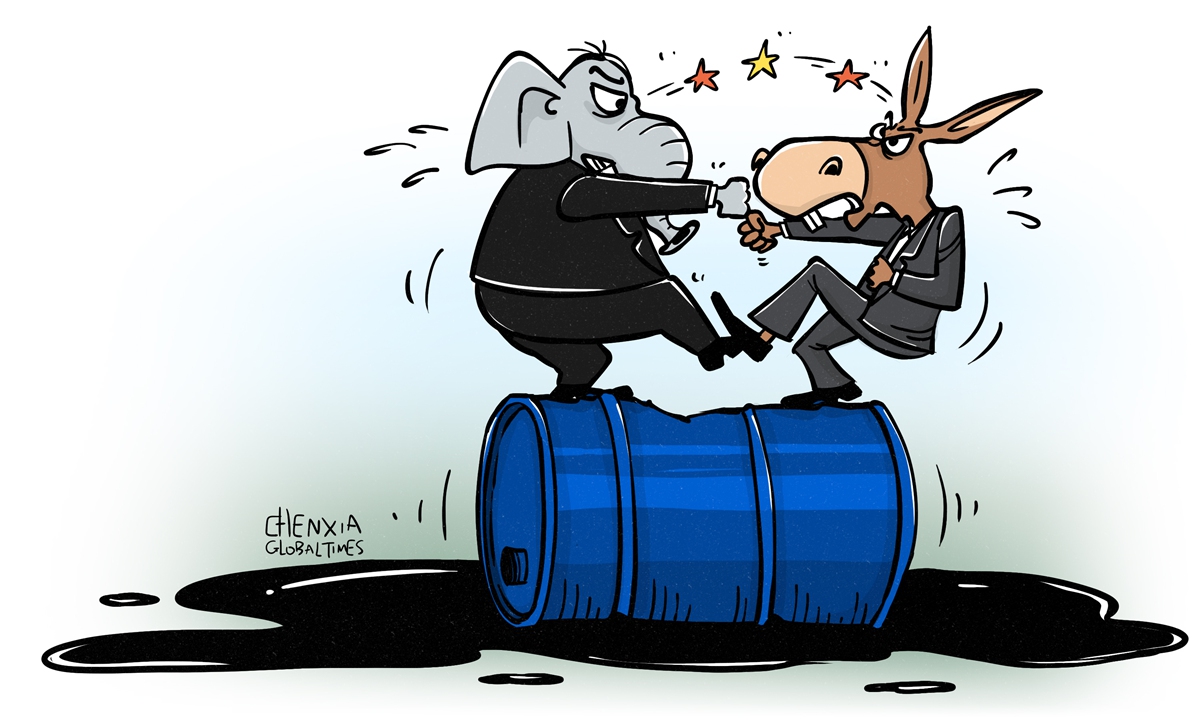
Illustration: Chen Xia/Global Times
For the second time this month, the US House of Representatives has passed a bill to curb President Joe Biden's ability to tap the nation's petroleum reserves - a measure that has already drawn a White House veto threat. While the division and polarization in US politics continues to escalate, what happened in the highest hall of "US democracy" has become a political farce, leaving the US economy as the ultimate victim.The bill, H.R. 21 (118), which was approved on Friday, would require the US government to offset any non-emergency withdrawals from the country's strategic petroleum reserve with new drilling on public lands and oceans, following a bill approved two weeks ago that would prohibit the US Energy Department from selling oil from the strategic reserve to "companies owned or influenced by the Communist Party of China," the AP reported.
"Draining our strategic reserves for political purposes and selling it to China is a significant threat to our national and energy security. This must be stopped," McMorris Rodgers, the new head of the House Energy and Commerce Committee, was quoted as saying.
It is a false proposition to "bar selling oil from the strategic petroleum reserve to China." What lies behind the bills is nothing but a fiercer partisan battle between Democrats and Republicans.
According to data from the US Energy Information Administration of the Department of Energy, in 2021, the US exported about 8.54 million barrels per day (b/d) of petroleum, among which only 0.63 million b/d are shipped to China, accounting for just 7 percent. Some US politicians claimed sales from the reserve accounted for about 2 percent of China's purchases of US oil, even if what they said is true, which is not, the number will be so small that can be negligible. So far, there is no evidence that the US is selling oil from its strategic petroleum reserve to China, such false proposition reflects nothing but endless partisan struggle within Washington.
Under growing pressure to bring down high energy prices, the Biden administration announced last year that the US would release up to 180 million barrels of oil from a strategic reserve to control commodity prices. Now, the heated rhetoric about reserve sales has become a part of a larger fight over the effectiveness of Biden's economic policies. There will probably be a standoff between the Republican-controlled House of Representatives and the Democratic-controlled White House over the issue. Even before the vote for the oil bill, US Energy Secretary Jennifer Granholm said Biden will veto the bill on the strategic petroleum reserve if it passes Congress, according to Reuters.
The division and polarization in US politics have already begun to erode the US economy. China is one of the world's largest energy consumers and is already the number one purchaser of many commodities. However, US supplies remain a very small share of Chinese oil imports because of their price disadvantages. Some US energy giants have long hoped that they can expand exports to China in order to reap larger profits, while observers hope that bilateral energy trade can help the US reduce its trade deficit with China. However, endless partisan struggle and populism has generated a spillover effect on normal Sino-US energy trade, and made US energy enterprises big victims.
The US side should abandon cold-war mentality and ideological bias, stop playing political tricks, stop disrupting normal Sino-US exchanges and cooperation in such fields as energy and climate change, otherwise, US energy enterprises will probably have to pay for the spillovers of bipartisan politics in Washington.
The ban on selling oil from US strategic reserve to China, even if implemented, would have little impact on China's oil supply, given China's diversified import sources and the very limited share of US oil in the Chinese market, but this will make US energy companies pay a huge price rather than earn profit.
Over the past years, the US has adopted a series of restrictive trade and investment measures as well as protectionist practices against China, which have all harmed the US economy. What US politicians should do now is to stop making more mistakes.
The author is a reporter with the Global Times. bizopinion@globaltimes.com.cn



